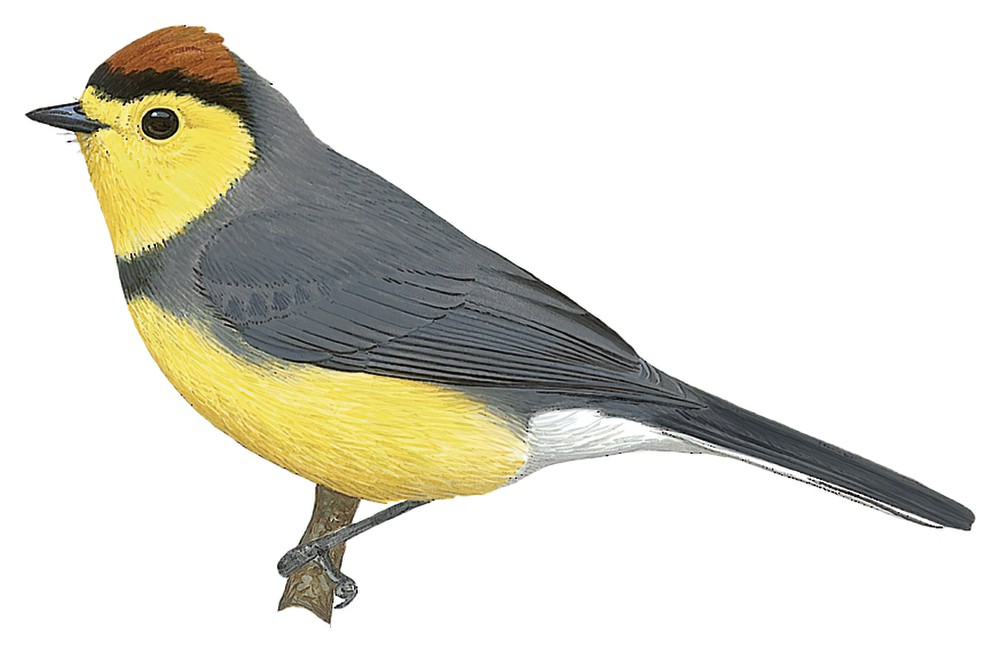Collared Redstart / Myioborus torquatus

Collared Redstart
SCI Name:
Protonym: Setophaga torquata Rev.Am.Birds 1 p.261
Taxonomy: Passeriformes / Parulidae / Myioborus
Taxonomy Code: colred1
Type Locality: San Jose, Costa Rica.
Author: Baird, SF
Publish Year: 1865
IUCN Status: Least Concern
DEFINITIONS
MYIOBORUS
(Parulidae; Ϯ Slate-throated Whitestart M. miniatus verticalis) Gr. μυια muia, μυιας muias fly; -βορος -boros -devouring < βιβρωσκω bibrōskō to eat up; "a. Bill attenuated towards the end; lateral outlines straight or concave. Tail decidedly longer than the wings. Second quill as long as 6th. Rictal bristles reaching nearly to tip of bill, which from gape is rather less than the length of skull. Tail considerably graduated (.50), the feathers soft, broad; the outer web of outer feather wide, nearly even, and about one-third the width of inner. A rufous patch on vertex. . . .Myioborus. ... Myioborus, BAIRD. (Type Setophaga verticalis, SW.) Rictal bristles very long, reaching to the end of the bill; the toes more as in ruticilla, though longer, the middle toe without claw about three-fifths the tarsus. The wings are shorter than the broad, soft, rounded tail, and the wing is much rounded; the 4th quill longest, the 1st about equal to the 7th. The species of this section have been usually referred to Setophaga, but differ very appreciably as indicated." (Baird 1865). Doubtless mistakenly, Baird gave the type as Setophaga verticalis "Sw." when he meant Setophaga miniata Sw., 1827, but now Setophaga verticalis Lafresnaye & d'Orbigny, 1837, is generally so regarded.
Synon. Erythrosoma.
torquatus
L. torquatus collared < torques collar, necklace < torquere to twist.
● ex “Tangara de la Guyane” of d’Aubenton 1765-1781, pl. 742 (syn. Arremon taciturnus).
● ex “Pic à cravate noire” of d’Aubenton 1765-1781, pl. 863 (Celeus).
● ex “Pluvier à collier” of Brisson 1760 (syn. Charadrius hiaticula).
● ex “Ring Plover” of Leach 1816 (syn. Charadrius hiaticula).
● ex “Pluvier à collier de S. Domingue” of Brisson 1760 (syn. Charadrius vociferus ternominatus).
● ex “Clouded Shrike” of Latham 1787 (Cracticus).
● ex “Barbu à Plastron Noir” of Levaillant 1806 (Lybius).
● ex “Ring Pheasant” of Latham 1783 (subsp. Phasianus colchicus).
● ex “Perruche à collier” of d’Aubenton 1765-1781, pl. 551, and “Perruche à collier couleur de rose” of de Buffon 1770-1783 (syn. Psittacula krameri).
● ex “Cochitenacatl” of Hernandez 1651, “Toucan à collier du Méxique” of Brisson 1760, “Cochicat” of de Buffon 1770-1783, and “Collared Toucan” of Latham 1781 (Pteroglossus).
● ex “Gobe-mouche à collier du Cap de Bonne Espérance” of Brisson 1760 (Saxicola).
● "95. TURDUS. ... torquatus. 13. T. nigricans, torque albo, rostro flavescente. Faun. svec. 185. Merula torquata. Gesn. av. 607. Aldr. orn. l. 16. t. 11. Will. orn. 143. t. 37. Raj. av. 65. n. 2. Alb. av. I. p. 37. t. 39. Frisch. av. 30. f. 1. 2. Habitat in Europa." (Linnaeus 1758) (Turdus).
● ex “Perruche à collier” of de Buffon 1770-1783, “Petite Perruche à collier de l’isle de Luçon” of Sonnerat 1776, and “Collared Parrakeet” of Latham 1781 (unident.).
UPPERCASE: current genus
Uppercase first letter: generic synonym
● and ● See: generic homonyms
lowercase: species and subspecies
●: early names, variants, mispellings
‡: extinct
†: type species
Gr.: ancient Greek
L.: Latin
<: derived from
syn: synonym of
/: separates historical and modern geographic names
ex: based on
TL: type locality
OD: original diagnosis (genus) or original description (species)












